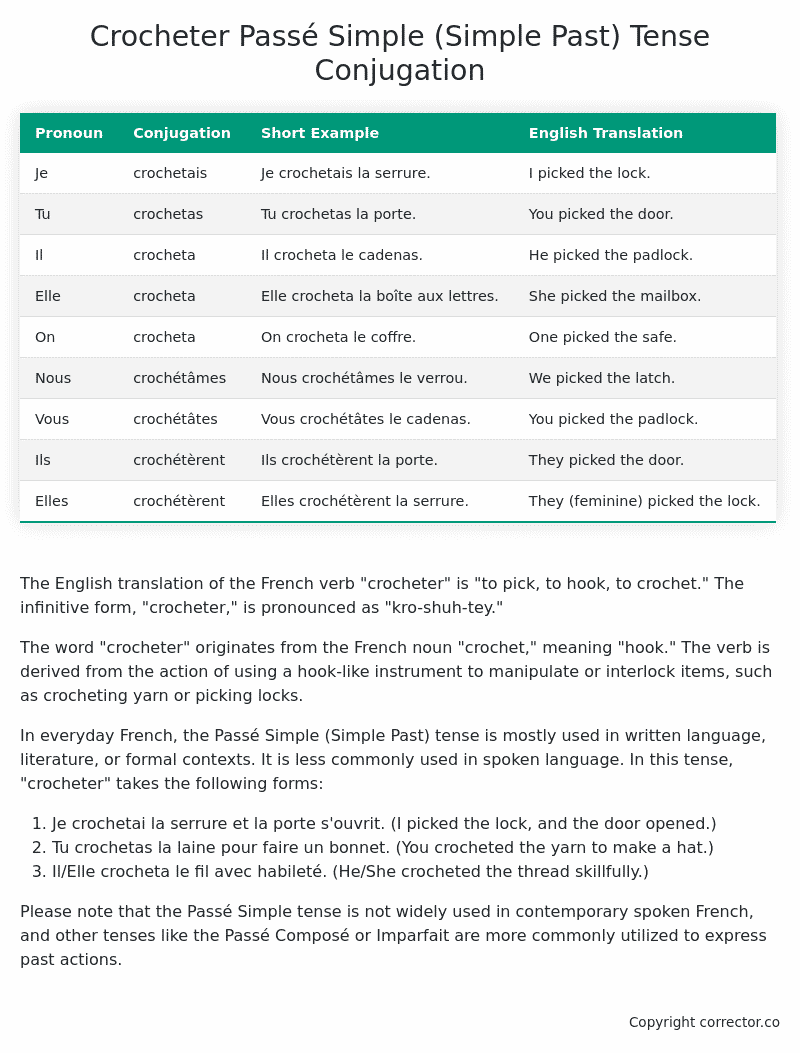Passé Simple (Simple Past) Tense Conjugation of the French Verb crocheter
Introduction to the verb crocheter
The English translation of the French verb “crocheter” is “to pick, to hook, to crochet.” The infinitive form, “crocheter,” is pronounced as “kro-shuh-tey.”
The word “crocheter” originates from the French noun “crochet,” meaning “hook.” The verb is derived from the action of using a hook-like instrument to manipulate or interlock items, such as crocheting yarn or picking locks.
In everyday French, the Passé Simple (Simple Past) tense is mostly used in written language, literature, or formal contexts. It is less commonly used in spoken language. In this tense, “crocheter” takes the following forms:
- Je crochetai la serrure et la porte s’ouvrit. (I picked the lock, and the door opened.)
- Tu crochetas la laine pour faire un bonnet. (You crocheted the yarn to make a hat.)
- Il/Elle crocheta le fil avec habileté. (He/She crocheted the thread skillfully.)
Please note that the Passé Simple tense is not widely used in contemporary spoken French, and other tenses like the Passé Composé or Imparfait are more commonly utilized to express past actions.
Table of the Passé Simple (Simple Past) Tense Conjugation of crocheter
| Pronoun | Conjugation | Short Example | English Translation |
|---|---|---|---|
| Je | crochetais | Je crochetais la serrure. | I picked the lock. |
| Tu | crochetas | Tu crochetas la porte. | You picked the door. |
| Il | crocheta | Il crocheta le cadenas. | He picked the padlock. |
| Elle | crocheta | Elle crocheta la boîte aux lettres. | She picked the mailbox. |
| On | crocheta | On crocheta le coffre. | One picked the safe. |
| Nous | crochétâmes | Nous crochétâmes le verrou. | We picked the latch. |
| Vous | crochétâtes | Vous crochétâtes le cadenas. | You picked the padlock. |
| Ils | crochétèrent | Ils crochétèrent la porte. | They picked the door. |
| Elles | crochétèrent | Elles crochétèrent la serrure. | They (feminine) picked the lock. |
Other Conjugations for Crocheter.
Le Present (Present Tense) Conjugation of the French Verb crocheter
Imparfait (Imperfect) Tense Conjugation of the French Verb crocheter
Passé Simple (Simple Past) Tense Conjugation of the French Verb crocheter (You’re reading it right now!)
Passé Composé (Present Perfect) Tense Conjugation of the French Verb crocheter
Futur Simple (Simple Future) Tense Conjugation of the French Verb crocheter
Futur Proche (Near Future) Tense Conjugation of the French Verb crocheter
Plus-que-parfait (Pluperfect) Tense Conjugation of the French Verb crocheter
Passé Antérieur (Past Anterior) Tense Conjugation of the French Verb crocheter
Futur Antérieur (Future Anterior) Tense Conjugation of the French Verb crocheter
Subjonctif Présent (Subjunctive Present) Tense Conjugation of the French Verb crocheter
Subjonctif Passé (Subjunctive Past) Tense Conjugation of the French Verb crocheter
Subjonctif Imparfait (Subjunctive Imperfect) Tense Conjugation of the French Verb crocheter
Subjonctif Plus-que-parfait (Subjunctive Pluperfect) Tense Conjugation of the French Verb crocheter
Conditionnel Présent (Conditional Present) Tense Conjugation of the French Verb crocheter
Conditionnel Passé (Conditional Past) Tense Conjugation of the French Verb crocheter
Conditionnel Passé II (Conditional Past II) Tense Conjugation of the French Verb crocheter
L’impératif Présent (Imperative Present) Tense Conjugation of the French Verb crocheter
L’impératif Passé (Imperative Past) Tense Conjugation of the French Verb crocheter
L’infinitif Présent (Infinitive Present) Tense Conjugation of the French Verb crocheter
L’infinitif Passé (Infinitive Past) Tense Conjugation of the French Verb crocheter
Le Participe Présent (Present Participle) Tense Conjugation of the French Verb crocheter
Le Participe Passé (Past Participle) Tense Conjugation of the French Verb crocheter
Struggling with French verbs or the language in general? Why not use our free French Grammar Checker – no registration required!
Get a FREE Download Study Sheet of this Conjugation 🔥
Simply right click the image below, click “save image” and get your free reference for the crocheter Passé Simple tense conjugation!

Crocheter – About the French Passé Simple (Simple Past) Tense
Formation
Usage
Narration
Historical Context
Interactions with other tenses
Passé Composé
Imparfait
Conditional and Subjunctive
Summary
I hope you enjoyed this article on the verb crocheter. Still in a learning mood? Check out another TOTALLY random French verb conjugation!


